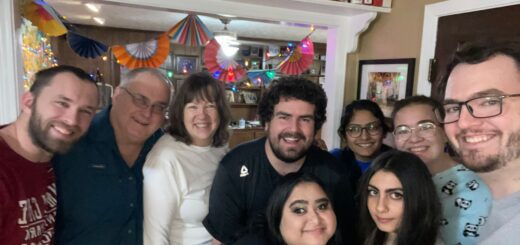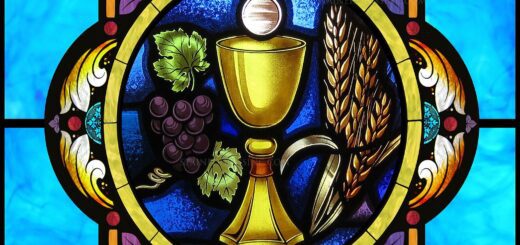By the Power of the Holy Spirit
By the Power of the Holy Spirit – July 9th, 2023
Winnie the Pooh, The House at Pooh Corner
Alice’s Adventures in Wonderland, Through the Looking Glass
It Ends with Us, It Starts with Us
Paradise Lost, Paradise Regained
The Hobbit, The Lord of the Rings
What do these all have in common? Yes, they are all two-part book series. Today we are starting a new sermon series in which we’ll focus on book two of a two-part book series in the Bible. The author of the two books of the Bible is known as Luke the Evangelist, a highly educated physician and one of the Apostle Paul’s disciples. His first book bears his name: Luke. His second book is the one we’ll be focusing on over the next couple of months: Acts, or the Acts of the Apostles.
While we’re not going to read every single verse in the book of Acts, we are going to step through most of it in sequential order. So first, let’s look at a couple of basics for the book of Acts as a whole and then we’ll dive into our portion for today. Acts was most likely written between 70 and 90 AD. Asbury professor Craig Keener describes two main purposes for the book of Acts:
- To record consistent legal precedents: Luke advocated that Christians should receive legal protection, paving the way for the toleration of Christianity in the Roman empire.
- To teach Christian apologetics: Luke wrote of the historical accuracy of the way of Christ, the fulfillment of Old Testament motifs, and that the gospel, the Good News of Jesus Christ, is unstoppable.
While emphasizing prayer, signs and wonders, and the Holy Spirit, the primary goal of the book of Acts is cross-cultural communication and world evangelization by the power of the Holy Spirit. Luke wants us to know that in Christ Jesus, salvation is now available to all people and all of creation, as God originally intended.
We will be looking at most of Acts chapters 1 and 2 today, so we’re going to read a portion at a time and notice a few things as we go along.
Acts 1:1-5 (NRSV) – “In the first book, Theophilus, I wrote about all that Jesus began to do and teach until the day when he was taken up to heaven, after giving instructions through the Holy Spirit to the apostles whom he had chosen. After his suffering he presented himself alive to them by many convincing proofs, appearing to them during forty days and speaking about the kingdom of God. While staying with them, he ordered them not to leave Jerusalem but to wait there for the promise of the Father. ‘This,’ he said, ‘is what you have heard from me; for John baptized with water, but you will be baptized with the Holy Spirit not many days from now.’”
Luke, by beginning his second book with these words, “I wrote about all that Jesus began to do and teach . . .” implies that what he writes after that is what the ascended and exalted Christ will continue to do and teach. But now Christ will be doing and teaching these things by the Holy Spirit in and through his followers, the church.
When Jesus ordered the apostles to wait in Jerusalem for the Father’s promise of the Holy Spirit, the Greek word which is translated here as “staying with them,” literally means they “took salt together,” which was an idiom indicating that they ate together around a table. This is more significant than we might initially realize, as eating together was the ultimate sign of what it means to be physically human. Angels could not eat as humans do. The resurrection convinced the disciples that Jesus was God. Eating together with Jesus after the resurrection convinced the disciples that Jesus was fully human.
Acts 1:6-9 (NRSV) – “So when they had come together, they asked him, ‘Lord, is this the time when you will restore the kingdom to Israel?’ He replied, ‘It is not for you to know the times or periods that the Father has set by his own authority. But you will receive power when the Holy Spirit has come upon you, and you will be my witnesses in Jerusalem, in all Judea and Samaria, and to the ends of the earth.’ When he had said this, as they were watching, he was lifted up, and a cloud took him out of their sight.”
Throughout his ministry, Jesus spoke often of the kingdom of God. Jesus’ resurrection had just occurred a few weeks earlier. Just before Jesus’ ascension, he spoke of the promised Holy Spirit. When the disciples, and actually all Jews of that time, heard of kingdom, resurrection, and Spirit together, they knew one thing for sure: the end of days was about to dawn. This is why the disciples asked Jesus after his resurrection, “Lord, is this the time when you will restore the kingdom to Israel?” Notice Jesus’ four-part answer. The first thing he makes clear is that the timing is not for us to know because the kingdom is not yet fully here. The second thing he says is that until the kingdom does fully arrive, we, his followers, will be his witnesses. Maybe we need to reimagine what that means. Being Christ’s witnesses is not a matter of blandly reciting the four spiritual laws or giving testimony in a courtroom. God transforms our very identity and empowers us, his church, to be a witnessing community together as we share the good news of Jesus Christ. The third thing is that we “will receive power when the Holy Spirit” comes upon us. In other words, the way we can share the good news of Jesus Christ is by the power of the Holy Spirit who equips us and gives us the ability to participate in the life of Christ. The fourth and last thing is that we will be Jesus’ witnesses not just in the places where we are most comfortable, but “to the ends of the earth.” This is a universal horizon because God’s mission is to rescue, renew, and restore all people and all of creation. The church’s mission is to proclaim and demonstrate Jesus’ rule and reign over all, calling others to submit to Jesus’ lordship. How do we complete this mission? Just as Jesus carried out his mission by the power of the Holy Spirit, he pours out the same Holy Spirit who gives us the ability to communicate Jesus’ words with other people. Jesus is present and active with us by the power of the Holy Spirit to carry out his own mission. Isn’t this all so amazing? This is the Good News!
Let’s also pay attention to the significance of Jesus’ ascension. When Jesus was lifted up and taken from the apostles “into heaven,” this confirms Jesus’ status as king, The King, The King whom the disciples finally realized was fully human and fully God.
Acts 1:12-14 (NRSV) – “Then they returned to Jerusalem . . . [and] went to the room upstairs where they were staying: Peter, and John, and James, and Andrew, Philip and Thomas, Bartholomew and Matthew, James son of Alphaeus, and Simon the Zealot, and Judas son of James. All these were constantly devoting themselves to prayer, together with certain women, including Mary the mother of Jesus, as well as his brothers.”
It’s easy to read verses like these and think that this meeting in the room upstairs where they were staying was on a Saturday night. But if we do the math, we realize it lasted a bit longer than that. There are fifty days from Passover to Pentecost. Jesus rose again on the third day. Luke has just told us that Jesus appeared to the apostles over a 40 day period. That means that this prayer meeting probably lasted for about a week! Let’s take a look at who was there – this gathering included the eleven remaining apostles, Mary his mother, “certain women,” and his brothers (in other words, relatives or those who now believed). Remember that on the night that Jesus was betrayed, all of his disciples had “deserted him and fled” (Mark 14:50). Maybe this is why Luke took the time here to list each of the apostles by name. Before, the disciples had all deserted Jesus and fled from him, but now they are back together, following Jesus. The resurrection changed everything. Before, they couldn’t stay awake for one hour in prayer. Now they are waiting, devoting themselves to prayer, for a whole week. They are “all in” for Jesus, waiting for the Holy Spirit that Jesus promised. The room was filled with anticipation as these serious disciples waited, devoting themselves to prayer, for a whole week.
Acts 1:15-16a,21-26 (NRSV) –
“In those days Peter stood up among the brothers and sisters (together the crowd numbered about one hundred twenty persons) and said, ‘Brothers and sisters . . . one of the men who have accompanied us during all the time that the Lord Jesus went in and out among us, beginning from the baptism of John until the day when he was taken up from us—one of these must become a witness with us to his resurrection.”’ So they proposed two, Joseph called Barsabbas, who was also known as Justus, and Matthias. Then they prayed and said, ‘Lord, you know everyone’s heart. Show us which one of these two you have chosen to take the place in this ministry and apostleship from which Judas turned aside to go to his own place.’ And they cast lots for them, and the lot fell on Matthias, and he was added to the eleven apostles.”
In ancient times, eyewitnesses were very important, as they are today. Peter is here making a case for the importance of choosing someone to replace Judas to be a witness with them to Jesus’ resurrection.
The casting of lots seems strange to our modern sensibilities, doesn’t it? It seems a bit like magic to us. It’s significant to realize that in the Greco-Roman world, fate was seen as a power or agency that predetermined and ordered the course of events. This is where our word “fatalism” comes from, referring to the belief that humans cannot alter their own fates or the fates of others. Luke understood this cultural belief and also knew the Old Testament which contains several examples of the casting of lots in order to select people for special duties or to decide other matters. The Jewish people used the lot because they believed in the sovereignty of God. They trusted God to make it work to show them what to do. Luke quotes from Psalms 69 and 109 to emphasize that history is moved along not by blind fate but in accordance with God’s revealed purposes in Scripture. It is not some random or possibly evil power that predetermines and orders what happens. It is God, the God who has been revealed as all-powerful, all-knowing, and all-good. And Jesus, through his life, death, and resurrection, has just proved that he is who he said he was, fully human and fully God.
That brings us to Acts chapter 2!
Acts 2:1-4 (NRSV) – “When the day of Pentecost had come, they were all together in one place. And suddenly from heaven there came a sound like the rush of a violent wind, and it filled the entire house where they were sitting. Divided tongues, as of fire, appeared among them, and a tongue rested on each of them. All of them were filled with the Holy Spirit and began to speak in other languages, as the Spirit gave them ability.”
Christ Jesus’ ascension and the giving of the Holy Spirit mark the birth of the church! The sound like the rush of a violent wind definitely got everyone’s attention! As we drove through Kentucky earlier this week, emergency alerts blared and vibrated through our phones repeatedly with alarming tornado warnings. They got our attention every time! Imagine what it was like in that house when the Holy Spirit filled the entire place! One thing is for sure – God had their full attention!
Let’s clear up some potential misunderstandings about tongues of fire. It’s important to note that here Luke is not talking about unintelligible speech, ecstatic utterances, or unarticulated babbling. When Luke says they “were filled with the Holy Spirit and began to speak in other languages,” he is talking about worship in actual languages that the speakers did not know. Remember that Luke’s primary goal in writing the book of Acts is “cross-cultural communication and world evangelization by the power of the Holy Spirit.” Inspired worship in other’s languages is directed right at the bullseye of this!
Later in that same chapter, Luke includes Peter’s explanation of what was happening as the fulfillment of an Old Testament promise regarding the gift of prophecy: Acts 2:18 (NRSV) – “Even upon my slaves, both men and women, in those days I will pour out my Spirit, and they shall prophesy.” We bristle at the use of the word “slaves” here – the Greek word translated here, “doulos,” properly means “someone who belongs to another” and is used with the highest dignity in the New Testament. It refers to believers who willingly live under Christ’s authority as His devoted followers. This has nothing to do with evil enslavement or compulsory work. It has to do with God pouring out his Spirit on all men and women who freely choose to submit to the lordship of Christ. In the kingdom of God, all barriers between people are broken down, and all people are reconciled, regardless of gender, ethnicity, language, culture, nationality, or class. The restoration of God’s kingdom by the power of the Holy Spirit, leveled the playing field for everyone. Today when we pray, “Come, Holy Spirit,” we are asking God that his proclaimed outpouring of the Holy Spirit on all people would find its fulfillment here and now.
Acts 2:5-7a,11b-13 (NRSV) – “Now there were devout Jews from every people under heaven living in Jerusalem. And at this sound the crowd gathered and was bewildered, because each one heard them speaking in the native language of each. Amazed and astonished, they asked, ‘Are not all these who are speaking Galileans? And how is it that we hear, each of us, in our own native language? . . . in our own languages we hear them speaking about God’s deeds of power.’ All were amazed and perplexed, saying to one another, ‘What does this mean?’ But others sneered and said, ‘They are filled with new wine.’”
There were only three times in a year when large numbers of Jews would make a pilgrimage to Jerusalem: Tabernacles, Passover, and Pentecost. Note that Jewish pilgrims traveled from throughout the Roman and Parthian worlds, which encompassed a huge area geographically including the Mediterranean region and its surrounds, northern Africa, all the way across to modern day Syria, Iraq, Iran, Afghanistan, and Pakistan. No matter what mode of transportation, whether on foot, by donkey, or in an airplane, many of these pilgrims had come a long way, and some had even settled in Jerusalem!
These pilgrims didn’t have YouTube or Duolingo to expose them to every language under the sun, as we do. For some, they would have heard only languages foreign to them as they went about the city. But on this day, the Holy Spirit supernaturally moved the church into multicultural diversity under Christ’s lordship, such that each person, no matter who they were or where they were from, heard about God’s deeds of power in their own mother tongue. No wonder they were amazed, astonished, and perplexed! If you’ve ever spent time in a country where most people speak a different language, you’ll realize that your ears will automatically pick up any words or phrases spoken in your own language, even fleeting words spoken by a passerby on a crowded street. Some of the passersby in Acts 2 didn’t understand what was happening and looked for an “ordinary” explanation. But this was no ordinary occurrence, no ordinary day.
On that Pentecost day when God poured out the Holy Spirit on the disciples, linguistic, ethnic, cultural, and national barriers between Israel and the Gentiles were overcome. What God had intended right from the start was that his people would be an attractive community that draws other people in, to the very ends of the earth. God’s promises have universal scope – they are for everyone, not just a select few.
Jesus proclaimed and demonstrated the kingdom of God by the power of the Holy Spirit. The early disciples proclaimed and demonstrated the kingdom of God by the power of the Holy Spirit. We are to proclaim and demonstrate the kingdom of God by the power of the Holy Spirit. Come, Holy Spirit, fill us again! Then send us out in your power to proclaim and demonstrate the kingdom of God. May the blind see, may the lame walk, may prison doors be opened, may the dead be raised, and may the poor receive the abundance of the church’s generosity! By your grace, let us live out the Acts of the Holy Spirit in our place and time. We pray all of these things in your name and for your glory, Lord Jesus!




